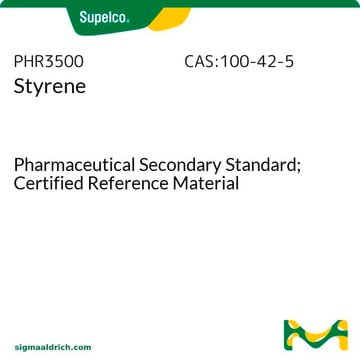240869
Styrene
ReagentPlus®, 99.9%
Synonym(s):
Phenylethylene, Vinylbenzene
About This Item
Recommended Products
vapor density
3.6 (vs air)
vapor pressure
12.4 mmHg ( 37.7 °C)
4.3 mmHg ( 15 °C)
product line
ReagentPlus®
Assay
99.9%
form
liquid
autoignition temp.
914 °F
contains
10-15 ppm 4-tert-butylcatechol as inhibitor
expl. lim.
6.1 %
refractive index
n20/D 1.546 (lit.)
bp
145-146 °C (lit.)
mp
−31 °C (lit.)
density
0.906 g/mL at 25 °C
storage temp.
2-8°C
SMILES string
C=Cc1ccccc1
InChI
1S/C8H8/c1-2-8-6-4-3-5-7-8/h2-7H,1H2
InChI key
PPBRXRYQALVLMV-UHFFFAOYSA-N
Looking for similar products? Visit Product Comparison Guide
Legal Information
replaced by
Signal Word
Danger
Hazard Statements
Precautionary Statements
Hazard Classifications
Acute Tox. 4 Inhalation - Aquatic Chronic 3 - Asp. Tox. 1 - Eye Irrit. 2 - Flam. Liq. 3 - Repr. 2 - Skin Irrit. 2 - STOT RE 1 Inhalation - STOT SE 3
Target Organs
hearing organs, Respiratory system
Storage Class Code
3 - Flammable liquids
WGK
WGK 2
Flash Point(F)
89.6 °F - closed cup
Flash Point(C)
32.0 °C - closed cup
Personal Protective Equipment
Certificates of Analysis (COA)
Search for Certificates of Analysis (COA) by entering the products Lot/Batch Number. Lot and Batch Numbers can be found on a product’s label following the words ‘Lot’ or ‘Batch’.
Already Own This Product?
Find documentation for the products that you have recently purchased in the Document Library.
Customers Also Viewed
Our team of scientists has experience in all areas of research including Life Science, Material Science, Chemical Synthesis, Chromatography, Analytical and many others.
Contact Technical Service










